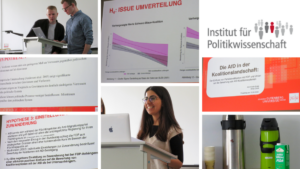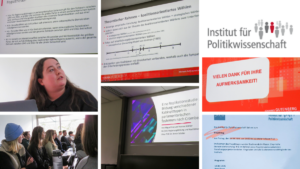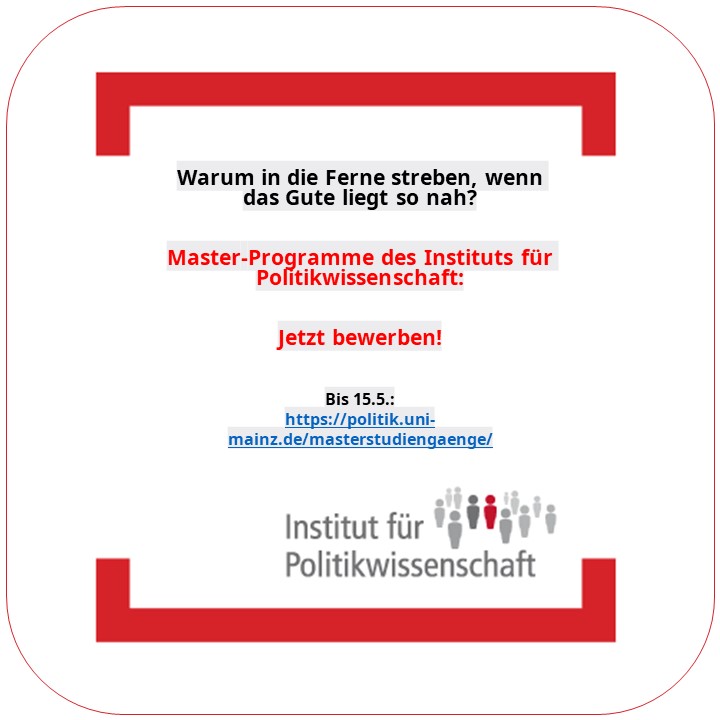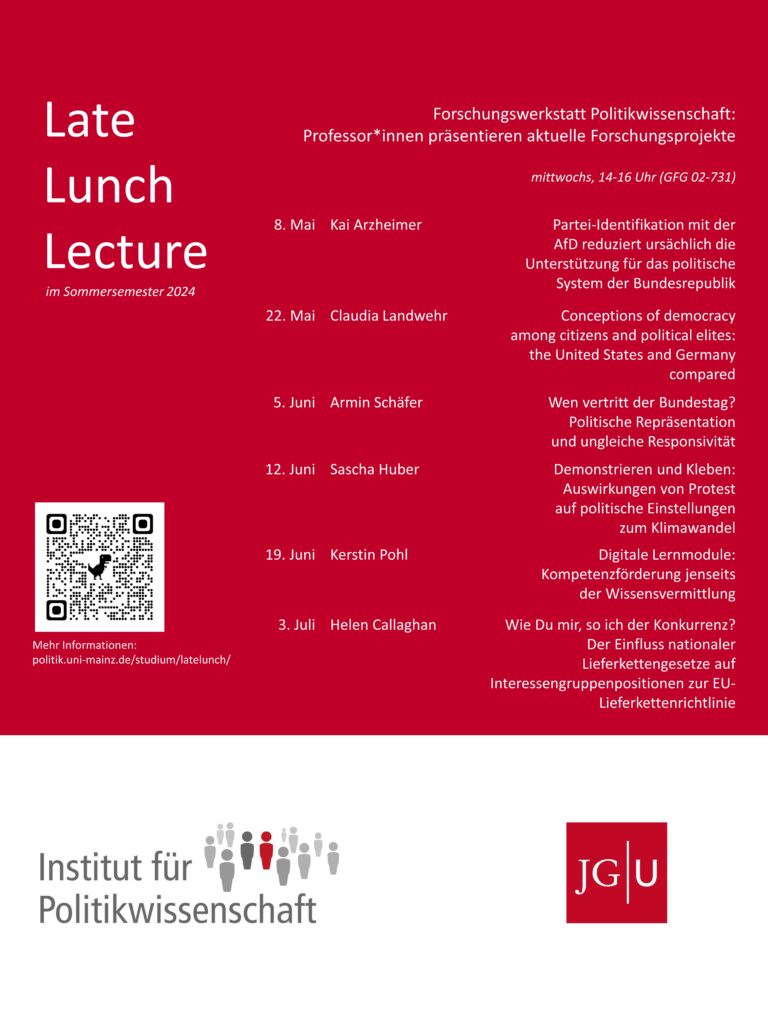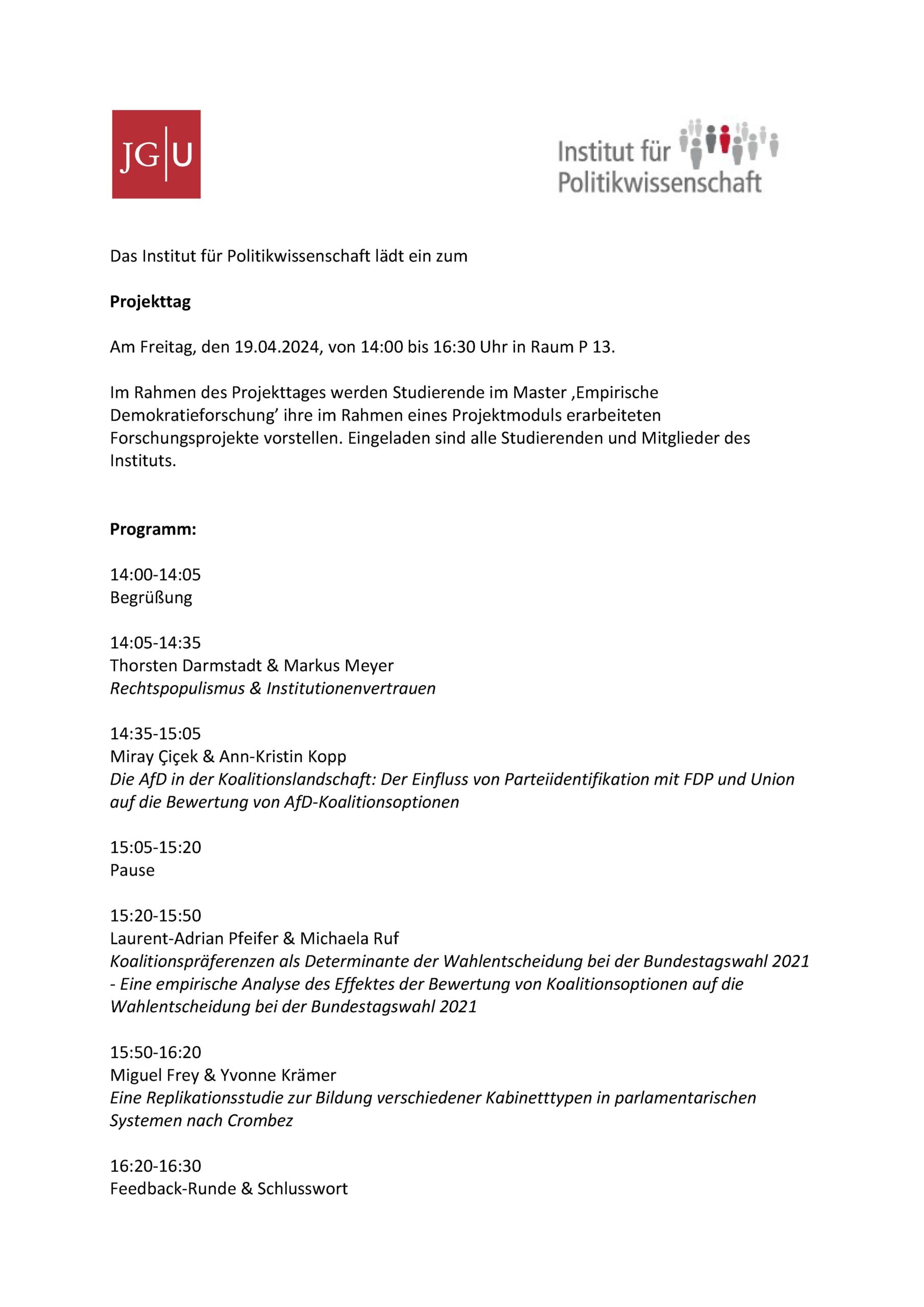Die Einführungswoche für alle Erstsemester startet am 08.04.2024. Herzlich möchten wir Sie zu unsere Einführungsveranstaltung einladen und Ihnen zugleich den Besuch auch sehr empfehlen, da an diesem Nachmittag für die Orientierung im Studium wichtige Informationen in kompakter Form vermittelt werden. Sie lernen außerdem wichtige Ansprechpartner*innen kennen und haben Gelegenheit, Ihre Fragen zu stellen.
Bitte beachten Sie, dass die Einführung zeitgleich in zwei Gruppen stattfindet:
- Die Einführungsveranstaltung für Studierende der Studiengänge Politikwissenschaft (B.A.) im Kernfach und im Beifach findet am Dienstag, den 09.04.2024 zwischen 14:00 und 14:45 Uhr im Hörsaal N6 (NatFak Hauptgebäude) statt.
- Die Einführungsveranstaltung für Studierende des Studiengangs Sozialkunde (B.Ed.) sowie für Studierende des Studiengangs B.Sc. Wirtschaftspädagogik mit Schwerpunkt Sozialkunde findet am Dienstag, den 09.04.2024 zwischen 14:00 und 14:45 Uhr im Hörsaal N3 (Muschel) statt.
Wir freuen uns, Sie persönlich zum Studienbeginn begrüßen zu dürfen!
Zusätzlich haben wir ein digitales „Willkommen“ auf der Informations- und Kommunikationsplattform der JGU (lms.uni-mainz.de) für Sie eingerichtet. Dieses Erstsemester-Moodle wird Ihnen ab Freitag, den 05.04.2024 zur Verfügung stehen - die Einladung erhalten Sie per Mail an ihren Uni-Account oder Sie gelangen zu diesem Erstsemester-Moodle (Einführung B.A. Politikwissenschaft/B.Ed. Sozialkunde) unter https://lms.uni-mainz.de. Im Moodle finden Sie Materialien und Informationen zum Studienverlauf, zur Organisation Ihres ersten Semesters und zu den Beratungsangeboten in der Einführungswoche, die Ihnen den Studienstart erleichtern werden.
Wenn Sie sich über den Aufbau Ihres Studiengangs und über das Institut für Politikwissenschaft informieren möchten, dann finden Sie wesentliche Informationen in unseren Erstsemesterbroschüren:
Erstsemesterbroschüre für Studierende im B.A. Kernfach Politikwissenschaft
Erstsemesterbroschüre für Studierende im B.A. Beifach Politikwissenschaft
Erstsemesterbroschüre für Studierende im B.Ed. Sozialkunde
Der Erstsemesterstundenplan gibt Ihnen Hinweise, welche Lehrveranstaltungen Sie sinnvollerweise im ersten Semester belegen sollten:
Erstsemesterstundenplan für Studierende im B.A. Kernfach Politikwissenschaft
Erstsemesterstundenplan für Studierende im B.A. Beifach Politikwissenschaft
Erstsemesterstundenplan für Studierende im B.Ed. Sozialkunde
Bitte beachten Sie, dass Sie sich im Laufe der Einführungswoche für die Lehrveranstaltungen anmelden müssen.
- Zweite Anmeldephase für Erstsemester und Studienortwechsler in Jogustine (unserer unieigenen Software): Montag, 08.04.2024 (13 Uhr) bis Donnerstag, 11.04.2024 (13 Uhr).
- Dritte Anmeldephase in Jogustine (Restplatzvergabe): Montag, 15.04.2024 (13 Uhr) bis Freitag, 19.04.24 (21 Uhr).
Eine Einführung in die Softwareplattform Jogustine wird von der Fachschaft Politikwissenschaft am Mi. 10.04.2024, 14:15h - 16:45h, im Raum P 206 (Jakob-Welder Weg 10, Philosophicum) angeboten. Dort hilft man Ihnen bei der Anmeldung für die Lehrveranstaltungen.
Für weitere Informationen rufen Sie bitte regelmäßig Ihre Emails in Ihrem Uni-Account ab (mail.uni-mainz.de). Tipps zur Freischaltung des Uni-Accounts finden Sie unter https://www.zdv.uni-mainz.de/erste-schritte-fuer-studierende/
Wir freuen uns auf Sie!



